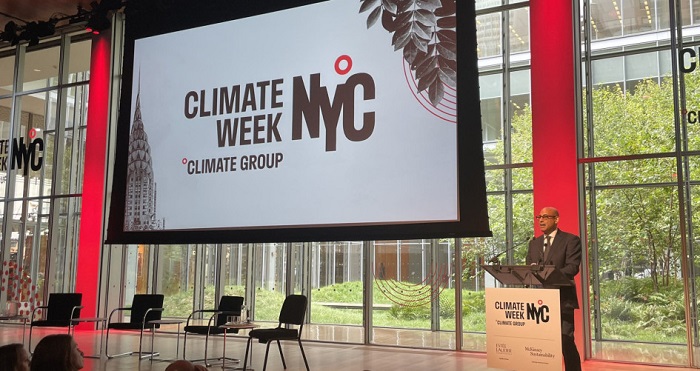Speaking at the opening of Climate Week New York City on Monday, September 19, 2022, the new Executive Secretary of UN Climate Change, Simon Stiell, described the upcoming UN Climate Change Conference COP27 in Sharm el-Sheikh in November as “the world’s first opportunity in the era of implementation of the Paris Agreement to demonstrate progress”

I may be new in this position, but I am certainly not new to these discussions and the broad challenges we face with respect to climate change.
As a former businessman and environment minister from a small-island nation, I’ve heard that word – challenge – a lot in relation to climate change.
Sea level rise is a challenge. Extreme weather is a challenge. The loss of lives and livelihoods is a challenge.
With all due respect, these aren’t challenges – they’re threatening emergencies.
Because behind every “challenge” there is a face and a name. A person and a place. Real lives. Real people …
… I believe in telling it like it is. So, let me be clear. We are in an emergency – and the enormous bedrock of science that this process is built upon, clearly shows that we are a species in trouble.
Despite this data, recently reinforced by a series of IPCC Reports, humanity continues to pollute the skies, poison its oceans, and wreak havoc on our land and biodiversity.
The recent WMO report – which Professor Taalas spoke to earlier – tells us that greenhouse gas concentrations continue to rise to record highs, and fossil fuel emission rates are now above pre-pandemic levels.
All of this despite aspirational talk about building back better and lowering emissions on a permanent basis.
We certainly need to close the emissions gap. But the biggest gap we must bridge is the gap between aspiration and reality. Meanwhile, the impacts of climate change grow exponentially worse.
We need no more encouragement than a daily look at global news. In every region, every country, we are seeing out of control impacts …
Pakistan, the Sahel, the US, Europe, the Pacific, the Caribbean – sea level rise, hurricanes, floods, fires … the list goes on. We’re so close to a tipping point we can see our own reflection in the rising waters.
If we don’t pull back, what’s to come is likely to be beyond our comprehension.
Again, we’re not talking about challenges, we’re talking about emergencies. If we want to avoid the worst impacts of climate change, we need to get off our current path – and fast.
The milestones on the path to safety … to opportunity are already known. We need to limit temperatures by 1.5C. To get there we need to cut emissions by half by 2030. That’s only eight years away.
The obvious question then is: why isn’t it happening? The hard truth is that in the last three decades we’ve put off the tough choices we need to make.
Yes, we’ve made some headway. But fighting an exponential emergency with incremental progress is like fighting a wildfire with a garden hose.
We’ve been unwilling to bear the full cost: as governments, as businesses, as people. We’ve been unwilling to accept what “systemic transformation” really means.
What it means for how we make profit. What it means for transportation, power, forestation. What it means to the way we live.
We look to the next country, the next business, the next person to do what it takes. But that’s not what it takes. We all have to do our fair share. That’s what the Paris Agreement is really about.
Ladies and gentlemen, this is a moment of truth for all of us. Let’s seize the momentum we have and boost it.
Paris, Glasgow and a host of other conferences proved that climate change has slowly moved to the centre of the international agenda.
Now, it is essential to put it at the centre of each national agenda. Because the only way to succeed globally, is for all countries to play their role.
This is, in a nutshell, why Sharm el-Sheikh must clearly show the pivot to a new era in our process: one that focuses on implementation.
Implementation means aligning those national agendas with the goals and commitments of the Paris Agreement through legislation, regulations, policies and programmes that pull human activity towards sustainable patterns of production and consumption.
It means providing the necessary finance, capacity building and technology support, especially support for the most vulnerable nations.
The core four work streams – mitigation, adaptation, finance and loss and damage – are familiar to all. Each has specific tasks that must be completed. They all share one overriding principle: the need for urgent action.
This must be the highest priority within the intergovernmental process – through more ambitious National Climate Action and National Adaptation Plans, subject to accountability through the Enhanced Transparency Framework.
At the same time, we need to see greater action outside the process, building on initiatives such as the Race to Zero, the Race to Resilience, the Glasgow Financial Alliance for Net Zero and other coalitions.
The change we need to see must sweep through the private sector in a matter of years, not decades.
